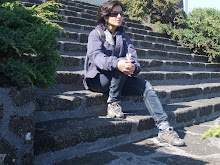 Dr. Angana P. Chatterji makes her acceptance speech after receiving the IMC's 'Tipu Sultan award for courageously serving India.
Dr. Angana P. Chatterji makes her acceptance speech after receiving the IMC's 'Tipu Sultan award for courageously serving India. The husband and wife team of Harpreet Kaur and Manmeet Singh. The duo made the film 'The Widow Colony on the Sikh widows of the 1984 pogrom.
The husband and wife team of Harpreet Kaur and Manmeet Singh. The duo made the film 'The Widow Colony on the Sikh widows of the 1984 pogrom.“Raped, raped, raped, raped, raped, raped, raped.”
Film-maker Harpreet Kaur let the words echo through the room seven times even as the audience shifted uncomfortably.
She was driving home the horror of seven rapes experienced by one of the victims of the 1984 pogrom against the Sikhs in
The lack of justice in
Nearly 450 people gathered at Meadows Club outside
The keynote address was delivered late in the evening after 8.30 by Tarun Tejpal, CEO and editor-in-chief of the investigative magazine, Tehelka. He spoke of the need to move away from the “politics of difference and back to the politics of ideas.” He said, “
The conference, began at mid-day after namaaz with the screening of four short films. All four examined the violence visited upon different minority groups – ‘The Widow Colony’ about Sikh widows of the 1984 killings, a CBS documentary by CNN’s Christian Amanpour on Dalits in Tamil Nadu, ‘Encountered on Saffron Agenda’ a documentary on encounter killings in Gujarat under Narendra Modi and an NDTV documentary on the murderous attack on Christians in Orissa called ‘In the Name of God’.
The films set the tone for the day’s discussion – minority groups are increasingly threatened even as perpetrators of violence are going scot-free.
A panel discussion on “Impunity: A Roadblock to Justice” saw panelists raise several human rights abuses taking place in
Another panelist, Rahul Deepankar, a doctor and a peace activist, raised the issue of lack of development in
The audience was asked to write down their questions for the panelists which were then read to them by an IMC member. But there was such a flood of paper that most questions went unanswered. Manmeet Singh who co-produced ‘The Widows Colony’ with his wife Harpreet Kaur was asked if the Sikhs had received justice after Manmohan Singh became the Prime Minister. To nods of approval from other panelists he said, “Lets create social bonds. Lets not leave Christian issues to Christians, Muslim issues to Muslims and Dalit issues to Dalits.”
After a quick coffee break the second panel discussion began on the topic, ‘Strengthening India’s Secular Democracy.’ Dr. Angana P. Chatterji, a rights activist and professor of social and cultural anthropology at the California Institute of Integral Studies questioned the very basis of
Robin Phillips, executive director of the Advocates for Human Rights, explained the definition of human rights but also took it out of an academic context by asking, “How can we ensure that good people are not silent in the face of human rights violations?” Here she urged her audience to be more attentive in small everyday acts and conversations.
Dr. Omar Khalidi from MIT and
It was a long day at the conference but most people appeared to have found the speakers very engaging.


4 comments:
'Can India call itself a democracy' - a very valid question. Merely having elected representatives - does it make a nation democratic? Liberty, Equality, Fraternity, Secularism-are all these confined to a mere mention in the constitution? Well, we are not 'undemocratic'. But we have a long way to go before we could claim to be a democracy in the truest sense of the word.
Anjana Chatterji's remark "If you cannot prove that you are Muslim or Christian during a census then you are automatically a Hindu!” is hugely thought provoking. Its Hinduisation at its worst. Its like elimination. By default, one is a Hindu. Others are almost incidental. I wonder if its really that bad, but there remains a lot to be changed, for sure.
Sathej
Hi Sathej,
This is a very complex question. Also, just a quick correction - it was Omar Khalidi who raised the point about the census.
Thanks.
Alaphia, I dont know if after my previous comments, my comments are still welcome. But if they are, I would like to add one 'minority' that are continually harassed, that is migrant labourers. Whether it is the MNS in Maharashtra or rebels in Manipur, their lives and limbs seem expendable ... Perhaps they dont belong in a forum for Indians abroad, but their stories have to be told. In India, it seems that anyone who does not have strength in numbers can be preyed upon.
Vikram, I agree with you.
Post a Comment